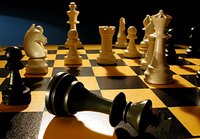
Friday, September 15, 2006
The Daily Hump: Mating Season
 We all know what a stalemate is. In chess this is a result when the person whose turn it is has no allowable moves and their king is not in check. More figuratively, a stalemate refers to any situation which ends in a draw. Likewise, when a stalemate occurs in chess the game is drawn. Before we delve into the etymology, I think it's interesting to note that a stalemate did not always result in no winner. Per the OED,
We all know what a stalemate is. In chess this is a result when the person whose turn it is has no allowable moves and their king is not in check. More figuratively, a stalemate refers to any situation which ends in a draw. Likewise, when a stalemate occurs in chess the game is drawn. Before we delve into the etymology, I think it's interesting to note that a stalemate did not always result in no winner. Per the OED,In England from the 17th c. to the beginning of the 19th c. the player who received stalemate won the game. Various other rules have been in vogue at different times; sometimes the player giving stalemate won, either wholly or to the extent of half the stake; sometimes the last few moves had to be played over again until a mate resulted; sometimes the piece causing the obstruction was removed.Up until the 18th c. the situation we now call a stalemate was simply known as a stale. For whatever reason the word mate was later appended as a suffix. It's generally believed that the word stale harkens back to the Old French estaler (to come to a standstill). Mate is simply a shortened form of checkmate, and a stalemate could not logically involve a checkmate, thus the word stalemate is a misnomer. On a side note, estaler was adopted into Middle English and spawned our modern verb stall.
Our modern word checkmate comes from the Middle English checkmat which was from the Old French eschec mat which goes back even further to the Arabic šāh māt, literally "the king is dead." The Arabic šāh, meaning "king", was borrowed from the Persian shāh--a title that was used by the monarchs of Iran, most recently by the leader deposed in the 1979 Iranian Revolution.
The plural form of checkmate's Old French ancestor, eschec mat is esches. In Middle English esches was shortened to simply ches, which is where, of course, we find our word for the game itself, chess.
Thus, linguistically speaking, chess is truly the game of kings.
stalemate [OED]
checkmate [OED]
Labels: Arabic, Middle English, Old French, Persian, The Daily Hump
:: posted by David, 8:59 AM